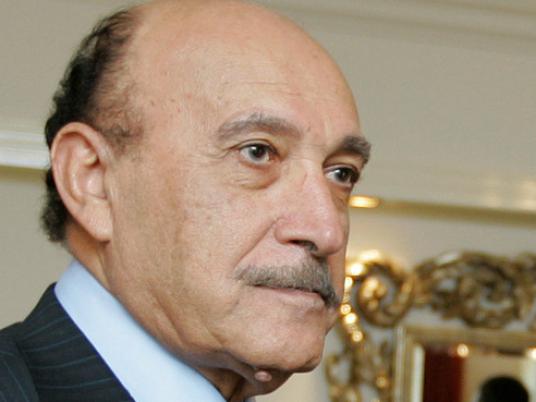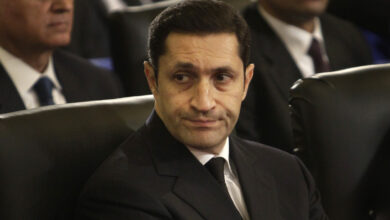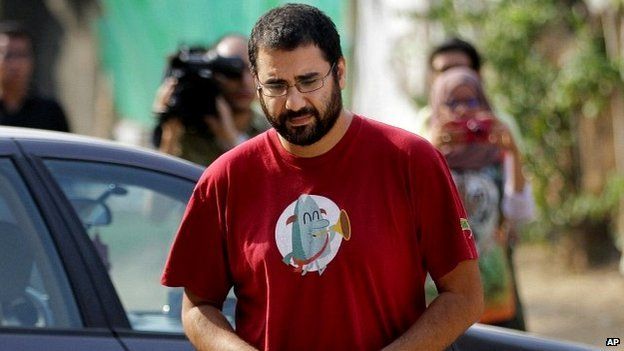
Omar Suleiman, the former spy chief now trying to run for the Egyptian presidency, says he wants the job to stop it going to the Islamist Muslim Brotherhood — but sees the Brotherhood playing a vital role in Egyptian politics.
A powerful but shadowy figure during the Hosni Mubarak era and one of the former president's closest aides, Suleiman joined the presidential race at the last minute and is now fighting disqualification by the commission overseeing the vote.
In a dramatic announcement on Saturday, the commission struck off 10 contenders, including Suleiman and two other front-runners — a Muslim Brotherhood candidate and a Salafi preacher.
Suleiman's team gathered 49,000 signatures in 15 provinces — more than the 30,000 needed — to back his candidacy, but the commission said he had 1,000 votes too few in one province. He has until Monday to appeal.
His campaign team announced on Sunday the suspension of his presidential campaign until 26 April, when a final list of all eligible candidates is due to be announced.
In an interview with Reuters on Saturday, before his exclusion was announced, Suleiman, 74, said he was running for office in response to public demands for a counterweight to Islamist influence.
"This is why they sought me, as a balance between Islamists and civilian forces," said Suleiman, who describes himself as a devout Muslim but adds that Egyptians fear their country is being turned into a theocracy.
"Many people felt that the state is going to the Muslim Brotherhood — in Parliament, in government and now the presidency," Suleiman said.
He said the domination of politics by the Brotherhood would hold the country back, but that if he became president, the party could serve in his government and would be a vital part of Egyptian political life.
Islamists protested against his inclusion in the list of contenders, and MPs have passed a law that, if approved by the military, would prevent Suleiman from running for the presidency, but he said he did not expect to be excluded.
The military council, which took power in February 2011 during the uprising that removed Mubarak after three decades in office, is due to hand power to an elected president on 1 July, the final step of a transition to democratic civilian rule.
Mubarak appointed Suleiman his deputy during his last days in power, and to most Egyptians, he is a symbol of Mubarak's rule, of security policies that kept Islamists on a tight leash, officially banned the Brotherhood and used force to suppress more radical elements.
Suleiman, however, distanced himself from the previous government's autocratic ways, saying the new president should have limited powers and that he, as president, would not exclude any party from political life.
Conciliatory towards Brotherhood
Since Mubarak's removal, the Brotherhood has moved fully into public life and won close to half the seats in Parliament. The Brotherhood is, Suleiman said, "a very important segment of Egyptian society."
"They have the right to practice politics and to have a role in society so long as it is within law and constitution," he said. "There is nothing to stop them participating as ministers or deputy prime minister or the prime minister," he said. "I will base my choice on competence, not party affiliations."
An army general, Suleiman comes from the same military background as all Egypt's rulers since 1952, a fact that has fueled suspicion that he is the army's candidate for the position. The army and Suleiman have both denied this.
Suleiman struck a conservative note on the role of the military in a democratic Egypt. Reformists want the army's influence, which extends into a wide network of business interests, to be curbed and its budget made public.
Suleiman defended the military council's management of the transition and said that, if elected, he would keep Field Marshal Hussein Tantawi, head of the council and defense minister for two decades, in his post.
Asked if he would trim the military's role, he said: "Why would you reduce their role? Are we going to tell them not to defend the state? … Are we going to tell them not to participate in any crisis that happens in the state?"
"If we have a crisis in manufacturing and we want to do something to save the state in a particular situation, who will I turn to as a president?" he asked. Beyond defending Egypt's borders, the military has built up an economic role that includes everything from road building to bread baking.
The powers of the next president are to be defined by a constitution which has yet to be written. Suleiman said he supported the idea of a presidential system, but added: "I hope that the president will not have wide influence … so we do not go back to the system of one-man rule."
He characterized his role in Mubarak's administration as one that dealt purely with external and security affairs and not government, though he said he had sometimes offered the former president advice on domestic affairs.
"I was not part of the previous administration. I was the head of the General Intelligence [Services] and I took care of the Egyptian national security and my work was all for Egyptian interests abroad," he said.
"I had nothing to do with domestic affairs. My relationships were with spies and foreign interests."




